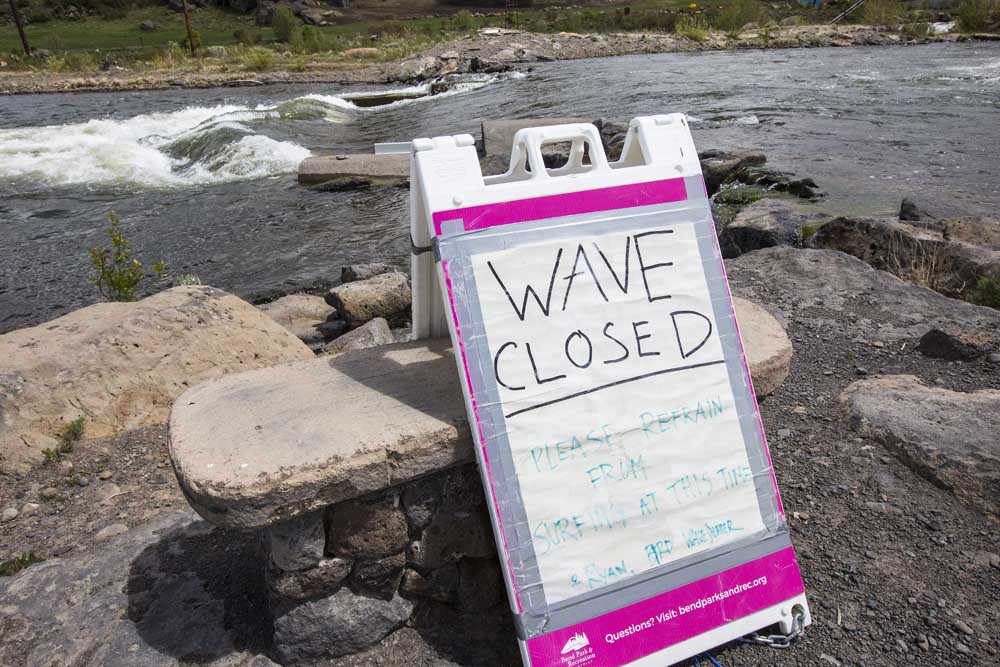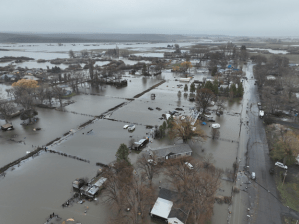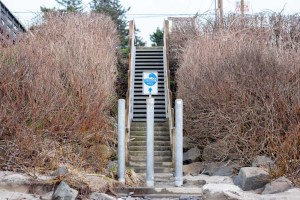2022 was a news-filled year in Central Oregon. Here are the year’s top stories
Published 8:45 am Friday, December 30, 2022

- A sign tells visitors in May that the surf wave at the Bend Whitewater Park remains closed. The Bend Park & Recreation District put surfing on hold while investigating the drowning death of 17-year-old surfer Ben Murphy.
There was no shortage of news in 2022.
In Central Oregon, 2022 was a year of shocking deaths that took place in quiet produce aisles, on idyllic rivers and icy ski slopes and in the throes of addiction.
Trending
It was a year when big issues continued to hit “our little town,” from gun violence and racism to climate change and an addiction epidemic. It was also a year of progress made and steps taken to hit back at those issues, from new housing planned to leaky old canals piped.
As the year draws to a close, The Bulletin revisited the top 10 most popular and influential stories from Central Oregon this year, based on online readership. Here’s what we’ll remember from 2022:
Three dead in Bend Safeway massacre
Bend made national headlines on Aug. 28 when a 20-year-old gunman entered the Safeway near NE 27th Street and U.S. Highway 20 and fired more than 100 rounds with a legally purchased AR-15-style rifle, killing two before killing himself. Amid chaos inside and outside the store, a produce clerk now hailed as hero attacked the shooter, saving precious seconds for others to escape.
The next day, authorities announced the two men who died in the shooting were Glen Bennett, a beloved regular at a local market who was shopping at Safeway that night, and Donald Surrett, Jr., the Army veteran who stalled the shooter. Community members grieved their deaths in private and in public.
As time passed, more details about the shooting emerged, including messages from the shooter’s final moments, shock expressed by his friends and family and more harrowing accounts from inside the store. Police officers increased their presence at local schools, candidates for office used the shooting as a point of debate and police responded to more requests for active shooter trainings. A police chaplain consoled first responders, whom the governor visited while the store’s neighbors felt unheard.
Trending
And, with time, the grocery store reopened.
Homelessness increases
The affordable housing crisis in the region and state continued at a fever pitch this year, with the vast majority of local employers reporting that a lack of housing strains their workforces. Developers this year also announced major new projects that could fill that need in the long run, including a 315-unit project proposed near the Box Factory in Bend and a 1,600-home development at the former KorPine site.
But housing challenges meant homelessness increased in Central Oregon by 17%, according to an annual January count, and at least 19 of the region’s 1,100 homeless people died in 2022. Local officials responded by purchasing a Franklin Avenue motel to use as an emergency shelter while other shelters are being renovated, and by approving new Safe Parking sites. It was also the first year of operation for Redmond’s first homeless shelter, operated in an old hotel by Bethlehem Inn.
Local government agencies this year also displaced people experiencing homelessness from various encampments with little suggestion of where they should go instead. Sweeps moved people from Oregon Department of Transportation properties, Forest Service property off China Hat Road and twice from areas around Bend’s Second Street. Bend city councilors also enacted new rules to strictly limit where unhoused people can live, and the city announced this week plans to remove 65 or more sites from the city’s north side in the new year.
Community members also read the stories of upwards of 30 people experiencing homelessness in the region with The Bulletin’s 25-part Faces of Homelessness series.
Ongoing record drought
Central Oregon’s water woes started early this year, with a dwindling snowpack indicating a dry year ahead. In March, drought declarations in the region marked the first time Deschutes County had declared a drought three years in a row as farmers in Jefferson County prepared to receive less water than they ever had before.
Those farmers were forced to rethink their operations, some packing up for good while late spring snow did little to overcome the multiyear drought, and the region’s reservoirs started the summer at their lowest levels ever.
By September, the Crooked River, Wickiup Reservoir and other key parts of the Deschutes Basin had dwindled to their lowest possible levels, causing declines in fish populations.
Farmers, irrigation districts and local officials continued efforts at water conservation in the basin, including water banking between districts, the use of new farming methods and efficiency upgrades to aging systems. So far this winter, precipitation has been about average, and not heavy enough to bring the region out of the drought.
Cranston convicted in Barry Washington killing
In November, a 10-year prison sentence closed the book on a high-profile murder trial that packed the courtroom and garnered public debate about the influence of race and racism on the killing of Barry Washington, Jr., a 22-year-old Black man, outside a downtown Bend bar in September 2021. Prior to sentencing, a jury found Ian Cranston guilty of first- and second-degree manslaughter, assault and the unlawful use of a weapon for shooting and killing Washington.
The jury found Cranston not guilty of second-degree murder, and Cranston’s attorneys said at the time they plan to appeal the verdict.
The eight-day trial included a number of dramatic moments, including Cranston taking the stand and describing to the jury his intention to shoot Washington in self-defense.
On the last drama-filled day of the trial, prosecutors pointed to Cranston’s decision to take a drag of a cigarette after shooting Washington as evidence that he wasn’t fearing for his life.
In downtown Bend, the corner of NW Oregon Avenue and NW Wall Street near where Washington was killed has informally come to be known as “Barry’s Corner.” Candles, flowers and other small tributes still sit on the sidewalk offering a quiet reminder of his death.
Spread of fentanyl drives rising overdose deaths
Drug overdose deaths in Oregon rose to historic levels in 2022, including in Central Oregon, where law enforcement officials say counterfeit pills containing fentanyl are appearing in numbers never seen before. The increased deaths, officials say, are connected to the rapid spread of fentanyl across the state and the lasting impacts of the COVID-19 pandemic.
The deaths have hit youth in particular especially hard: Crook Country reported that the largest group of overdose cases in the first quarter of 2022 were among people between 20 and 29, for example.
November marked two full years since voters passed Measure 110 to decriminalize possession amounts of drugs in the state. The measure provided hundreds of millions of dollars in new funding for a spectrum of addiction services, but the money has only just begun to hit communities. Many experts remain hesitant to link the increasing overdoses to the measure’s passage, citing a variety of other causes.
St. Charles faces financial crisis
2022 was a chaotic year for Central Oregon’s St. Charles Health System as it grappled with the lasting financial impacts of the pandemic, staffing issues and labor disputes.
The hospital system posted a $17.2 million operating loss in the first quarter, on the heels of finishing the prior year in the red, due to higher costs and a lack of profitable elective surgeries during the pandemic. By the end of April, the system was $21.8 million in the red and, in May, announced the layoff of 105 workers and elimination of 76 other positions.
In July, 8-year CEO Joe Sluka announced his departure from the hospital. Two days later, the hospital laid off two other hospital executives. The same month, the hospital told the Oregon Health Authority it had an emergency due to its staffing shortage, attempting to invoke “crisis standards of care” that the health authority said couldn’t apply.
By December, 2022’s losses for the hospital system ballooned to $28 million, despite four months of positive operating income.
Slurs damage region’s students and reputation
Racist incidents made headlines in Central Oregon several times this year.
In March, The Bulletin shared the stories of families who removed their children from area schools because their students were subjected to racist bullying. At the time of the reporting, the region’s school districts had counted around 150 bias incidents so far in the school year.
Bend-La Pine Schools board member Marcus LeGrand visited five different schools in February to help administrators address bias incidents in their schools.
Racism in Bend also attracted online attention after Nelson Holland, a Black outdoors influencer, posted a TikTok video detailing how he was called a racial slur three hours into his visit to the city. Holland, who was visiting from Colorado, came to the area to go climbing for the first time at Smith Rock and said the incident meant he wouldn’t come back to Bend by himself.
By late December, Holland’s TikTok has been viewed more than 142,500 times and liked 41,200 times.
Library rejects calls to move, label LGBTQ books
The nationwide wave of anti-LGBTQ sentiment appeared in Central Oregon this year as community members in Crook County debated whether or not to label or segregate kids’ books with LGBTQ-affirming themes or references in the county library.
The debate began attracting headlines in May, when the Crook County School District announced it would send students from Steins Pillar Elementary School, which lacks its own library, to other elementary school libraries in the district instead of the to Crook County Library.
District Superintendent Sara Johnson told The Bulletin the change was made after some in the community expressed concerns about “controversial books and other materials” available in the county library. Specifically, commenters at a packed library board meeting raised objections to books like one about a teen questioning his identity.
In the following months over a series of heated board meetings, commenters demanded the county library label books with themes they objected to or separate them into their own section so they’d be less accessible to children in the library. April Witteveen, then the director of library services, said the controversy was part of the reason she chose to leave the job.
But a wide range of commenters defended the books, saying it was important to keep them in the library for the sake of intellectual freedom. Those arguments — and projections that any move to segregate the books would cost the library system thousands of dollars in grants and contracts — won out when library trustees voted 4-1 in December to leave the books as they were.
17-year-old’s death at surf wave prompts changes
The Bend surf community was shocked in May when Ben Murphy, a 17-year-old Marshall High School student, died in the first-ever fatal incident at the Bend Whitewater Park surf wave. Murphy was trapped underwater for around six minutes after his foot got stuck in the gate that forms the wave and later died in the hospital.
Witnesses described surfers jumping in the river in an attempt to free Murphy while he was submerged, and the tragedy surfaced prior reports of close calls at the wave.
Seven weeks after the teenager’s death, the Bend Park & Recreation District reopened the wave with a handful of new safety measures, including modifications to the gates that trapped Murphy’s foot, additional signs about the wave’s safety risks and a ban on surfboard leashes that proved controversial with some surfers. The ban became permanent in October.
The Deschutes River claimed the lives of at least two other recreationalists this year, including Joseph Torkelson, 56, and Maximillian Zelaya, 41.
Mt. Bachelor saw deadly ski season
Mt. Bachelor ski area saw an unusual number of fatal injuries in 2022. On the first of the year, Birkan Uzun, 28, died after having fallen into a tree well the day before.
On one February weekend, Thomas Schuberg, 66, died in a high-speed crash the day before Theodore Speer, 60, died in a similar incident. A third skier was airlifted to the hospital the following day due to a “medical emergency,” and another skier was airlifted to the hospital two weeks later for her injuries.
The parents of a 9-year-old boy who died after slipping down an icy slope in 2021 sued Mt. Bachelor in August, asserting the ski area should have closed the ski run because of the ice.
Mt. Bachelor responded to the $49 million lawsuit through court filings, saying the child’s death was the fault of him and his father.








